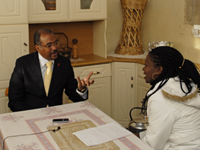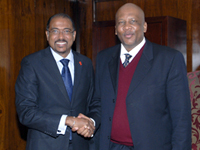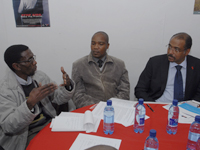
Feature Story
Lesotho: HIV free babies bring hope
16 July 2009
16 July 2009 16 July 2009
Michel Sidibé chats with Ms Pitso of mothers2mothers
Credit: UNAIDS/G. Williams
“Strengthened services for maternal health, for reproductive health and for paediatric health will mean we can prevent mothers from dying and babies from becoming infected with HIV in Lesotho and around the world,” said Mr Michel Sidibé, UNAIDS Executive Director.
Strengthened services for maternal health, for reproductive health and for paediatric health will mean we can prevent mothers from dying and babies from becoming infected with HIV in Lesotho and around the world,
Michel Sidibé, UNAIDS Executive Director
Mr Sidibé was speaking during his official visit to Lesotho which ended with a visit to the children’s ward and mother and child health section of the Queen Elizabeth II hospital in Maseru. He was accompanied by the Minister of Health Dr Mphu Ramatlapeng.
Mr Sidibé earlier was welcomed into the home of Ms Pitso a HIV-positive mother who thanks to access to services for the prevention of mother-to-child transmission gave birth 11 months ago to her baby boy Emlyn who is free of HIV. Mr Sidibé listened to Ms Pitso’s hopes for a bright future for her son. Mr Sidibé has championed the prevention of babies from becoming infected with HIV as a priority for UNAIDS and its Cosponsors.

Lesotho Minister of Health and Social Welfare Dr Mphu Ramatlapeng (left) meets Michel Sidibé, executive director of UNAIDS.
Credit: UNAIDS/G. Williams
Lesotho has made progress in coverage of prevention of mother-to-child transmission services for pregnant women, up from 5% in 2006 to 42% in the first quarter 2009. Without any intervention, an HIV positive pregnant woman’s chances of passing HIV to her baby are 30-40%. Infection transmission is the highest during pregnancy and delivery, but also during breastfeeding, especially if breast milk is mixed with other feeding. With the provision of a comprehensive prevention services, the transmission rate can be reduced to less than 2%.
“Lesotho is a model in its achievements, particularly in the field of preventing mother to child transmission of HIV,” said Mr Sidibé.
At the Queen Elizabeth II hospital, Mr Sidibé also acknowledged the contribution and commitment of health care workers. Addressing staff shortages in health and social sectors has been an aim of the Government of Lesotho who in partnership with the UN have developed an emergency human resources strategic plan, which includes ways of attracting, training and retaining health personnel.
 His Majesty, King Letsie III (right) and UNAIDS Executive Director Michel Sidibé. Maseru, Lesotho. 15 July 2009
His Majesty, King Letsie III (right) and UNAIDS Executive Director Michel Sidibé. Maseru, Lesotho. 15 July 2009Credit: UNAIDS/G. Williams
His Majesty, King Letsie III hosted a meeting yesterday with the Executive Director. Mr Sidibé also met with and Prime Minister Pakalitha Bethuel Mosisili-Qhobosheaneng, members of Lesotho’s national AIDS Commission, and other senior government officials.

Michel Sidibé, executive director of UNAIDS (right) listens to members of civil society describe their challenges.
Credit: UNAIDS/G. Williams
During his two day visit he participated in a joint civil society meeting with the Lesotho Network of People Living with HIV and AIDS (LENEPWA), Lesotho Inter-Religious AIDS Consortium (LIRAC) and Lesotho Council of NGOs (LCN). The organizations stressed the need for strengthened institutional capacity and delivery of meaningful and evidence based programmes to achieve a unified response to HIV.
Mr Sidibé, addressing the participants who are openly living with HIV, said “It is because of your experience and your life that we have managed to break the conspiracy of silence surrounding HIV and AIDS.”

Mr Sidibe and Ms Caroline Ama Sande, UNAIDS Country Coordinator Lesotho were guests at a traditional Basotho performance by UN staff.
Credit: UNAIDS/G. Williams
Mr Sidibé had a meeting with UN staff and the UN Country Team followed by lunch catered by Positively Masutsa, a catering service exclusively employing HIV positive people.
An evening event hosted by acting Minister of Foreign Affairs & International Relations, Mr Semano Sekatle included the launch of the first Joint UN programme on AIDS in Lesotho. Launching the joint programme Ms Ahunna Eziakonwa-Onochie, the country’s UN Resident Coordinator said: “Lesotho deserves a unified UN that is not fragmented, that does not duplicate efforts and resources, but stands in a united front against the scourge of HIV.”
Lesotho has the third highest adult HIV prevalence in the world with 23% of those aged 15 to 49 living with HIV. Multiple sexual relationships are a major risk factor in Lesotho’s hyper endemic HIV situation.
Lesotho: HIV free babies bring hope
Multimedia:
Feature stories:
Ambitious project brings key countries in eastern and southern Africa closer to ‘knowing their epidemics’ (25 May 2009)
Lesotho’s church leaders step up AIDS response (18 July 2007)
External links:
Publications:
The analysis of prevention response and modes of transmission study (MOT) synthesis report Lesotho (pdf, 1.4 Mb)
Lesotho - UNGASS 2008 Country Progress Report (pdf, 848 Kb.)



